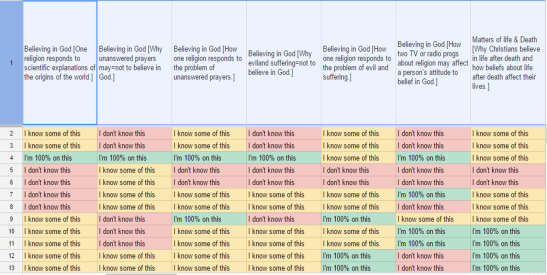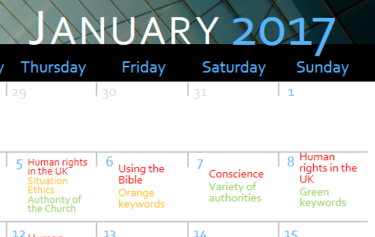This is the time that teachers and hopefully students, may start thinking about ‘revision’. Whilst I think it is important to teach things well in the first place, planning revision for an exam is important. Students will have so much to remember, this strategy has been based on what research suggests might be beneficial in this process.
Please feel free to share this with students. There’s an assembly/tutorial powerpoint at the end for teachers to sue.
Preparation
- Get a copy of everything that you need to know. Divide it into small chunks – maybe one key concept/skill or 4-6 facts. If appropriate, a copy of the specification may be useful here. Examples of GCSE Edexcel Religious Studies Unit 1 & Unit 8.
- Get the date of your exam/s
- Print off a copy of a calendar that covers the time between now and the exam. Lots of templates here (choose one with writing room for each day). Put your exam/exams on the calendar on the correct date.

Where you are now
- Take the copy of everything you need to know and rate it/highlight it with a colour based on the following:
- If it were an exam question on a paper you did today, would you…
- be able to answer it fully without any problems?
- be able to answer some of it, but not all/could attempt an answer?
- not be able to answer any of it/have no idea what it is?
- If it were an exam question on a paper you did today, would you…

Example of RAG rated content
(Teachers – This can be done electronically so you can get a copy of this for your whole class. Example Google form HERE and example responses:

The following will depend on how long you have until your exam. As per the example above, it is 138 days until the first exam so we will use this as an example:
RED – Decide if you need further help on this. If so, ask a teacher, friend, someone in class, online explanation etc Once you’re clear on understanding…
Put these topics into your timetable with increasing gaps. Don’t do it every day. It is best to revise it giving time to forget in between. In this model you might re-cover them 4-6 times.
For example, if ‘Humans rights in the UK’ is red add it to your calendar and then from the first time you cover it leave 3 days, 7 days, 21 days, 50 days, 120 days. A rough guess would be that you could cover red topics 5 times before the exam but it depends on a) how long you have til the exam, b) how much content in total you have and c) how many subjects/exams you have.

ORANGE – Do the same as the red but you may only need 2-3 repeats before the exam Remember to space them out with increasing gaps.
GREEN – Put these into your timetable 1-2 times before the exam. You don’t need to spend hours going over what you already know. Make sure you do know it 100%. If after the first revision you’re not sure. Make it orange and add some revisions to your calendar.
Add the topics to your timetable. They are 5-10 minute activities so if you work out how much time you have in each day, you can allocate in multiples of 5-10 minutes.

REMEMBER – these will be short activities so can be done in many places. Don’t think you have to sit at a table for hours and hours to revise.
Where else could you do these?
- On the bus on the way to school
- During registration time
- During study periods
- Whilst the register is being taken (If nothing else given to do – check with teacher)
- Waiting for a bus
- At break/lunchtime
- Sitting on the toilet?! In the bath?!
Choose an activity
These should be kept short (5-10 mins unless it’s a full essay practice). Reading/highlighting your notes is not a useful activity unless you do something with those notes afterwards. Examples of short activities:
- Create a revision card/s for that ‘chunk’
- Test yourself using your revision card/s (Don’t turn over until you’ve thought of the correct answer/s or you’re sure you don’t know them
- Write an exam answer and answer in the time you’d have in the exam
- Write a quiz on the topic
- Do a quiz on the topic
- Create a picture/info graphic that links the key ideas
- Write 50 words to explain the topic/concept
- Explain the topic/concept to someone else (then get them to ask you questions to further their understanding)
The best activity you can do will test your memory. TEST TEST TEST. Then check for the correct answers.
Flexibility
Try and stick to your timetable. Ensure you timetable according to the time you have. Allocating 5 minutes to one topic activity on your birthday isn’t the end of the world. It doesn’t have to be hours every day. If you miss any topics ensure you add them to another day or if you realise you know a topic better than you’d initially recorded, reduce the repetitions.
HERE is a powerpoint that can be used in an assembly or school website or shared with students/parents.
Further revision ideas/blogs
- https://missdcoxblog.wordpress.com/2016/01/12/using-research-to-design-a-revision-session/
- http://www.learningscientists.org/downloadable-materials/
- https://huntingenglish.wordpress.com/2013/04/07/effective-revision-strategies/
- https://missdcoxblog.wordpress.com/2016/01/09/ditch-revision-teach-it-well/